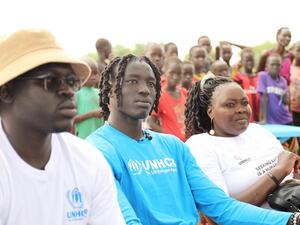As Boko Haram retreats, concern grows for Nigerian returnees
As Boko Haram retreats, concern grows for Nigerian returnees

Nigerian returnees sit in front of a house destroyed by Boko Haram in Garaha, Adamawa state, Nigeria in this May 2016 file photo.
GENEVA – Hundreds of internally displaced people are returning to devastated villages and towns recently liberated from Boko Haram in north-east Nigeria’s Borno state, raising concerns about living conditions, basic services and security in the area, UNHCR, the UN Refugee Agency, said today.
The ongoing campaign by Nigerian Government forces in cooperation with the Multi-National Joint Task Force has rolled back gains by the militants, whose insurgency has displaced more than two million people within Nigeria since 2014.
Hundreds of thousands of people in Borno are already in urgent need of help, UNHCR spokesperson Leo Dobbs told a news briefing in Geneva on Friday (September 9), noting that the number of people returning to liberated areas is expected to increase in the coming weeks.
“Comprehensive figures are not available but our field staff and partners are reporting both government-facilitated and spontaneous return in recent days of hundreds of people to places such as Mafa, Konduga, Benisheikh and Dikwa,” Dobbs told reporters at the Palais des Nations in Geneva.
“UNHCR is working to ensure returns are conducted in accordance with international standards and in dignity and safety."
Assistance from the government and aid agencies has been stepped up to the region to help people in 16 newly accessible districts of Borno. UNHCR and its partners have only restricted access to 10 of these districts, where some 800,000 people need urgent help.
Dobbs said some of those now returning to their homes in the liberated areas from places like the Borno capital, Maiduguri, appear to be happy to go back, citing dire conditions in the places where they have been living, including camps for the internally displaced.
He stressed that UNHCR is concerned about the welfare of the people, who are returning to areas that have been devastated under Boko Haram rule. Many of the internally displaced will be going back to destroyed homes and infrastructure, and areas lacking health care and other services.
“The returns should be voluntary, dignified and safe - people should be informed about conditions in their home areas,” Dobbs said.
“UNHCR is in regular touch with state officials and we have raised our concerns and offered to work closely with them to help ensure that returns are conducted in accordance with international standards and in dignity and safety. We will continue to monitor the situation of returnees, especially the most vulnerable,” he added.
Meanwhile, as UNHCR and partners scale up their operations in the north-east, security and access to the needy, especially those in the newly accessible areas, remain major challenges. A greater humanitarian response and presence on the ground is urgently needed, aid efforts must be better coordinated, and data collection improved.
The insurgency in north-east Nigeria has forcibly displaced more than 2.25 million people since 2014.
“Most of the displaced are women, children and the elderly. Priority issues that UNHCR and our partners are working on include shelter, food, provision of potable water as well as health concerns, including acute malnutrition and cholera prevention,” Dobbs said.
“Protection issues include sexual and gender-based violence, where we have had successes through community-based protection action groups that encourage dialogue and awareness.”
On the ground, UNHCR continues to work through local partners to carry out vital protection monitoring in Bama, Monguno, Damboa, Konduga, Mafa, Dikwa and including Biu, Bayo, Hawul, Shani and Kwaya Kusar districts in southern Borno.
The UN Refugee Agency has also provided 200 shelters for 1,000 people in Bama and has distributed non-food items to 16,000 people in the past two weeks. Aid includes 10,000 items distributed to people in the Cameroon-Nigeria border town of Banki. In Maiduguri, UNHCR has constructed almost 2,000 semi-permanent shelters for around 10,000 people, and is building emergency shelters for 5,000 people in Dikwa.
The insurgency in north-east Nigeria has forcibly displaced more than 2.25 million people since 2014, including 2.066 million people displaced within the country’s borders and almost 190,000 refugees in neighbouring Cameroon, Niger and Chad. Although the government has rolled back Boko Haram gains since last year, the insurgency has switched to terror attacks and remains a potent threat.








